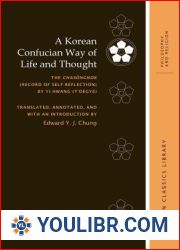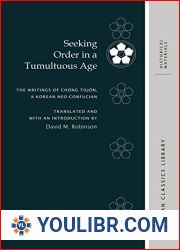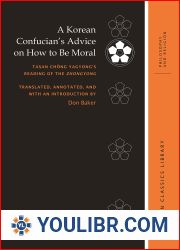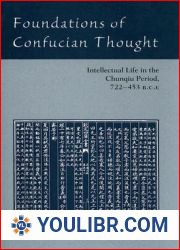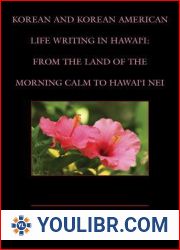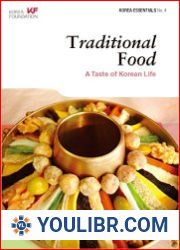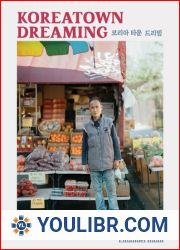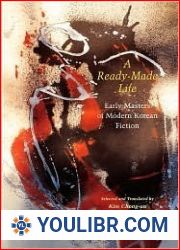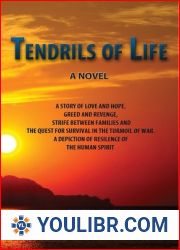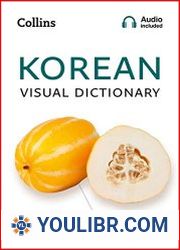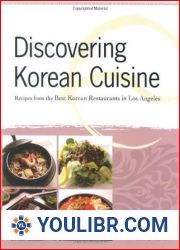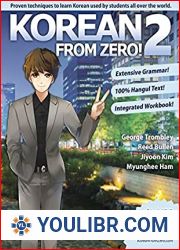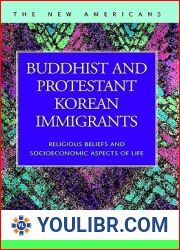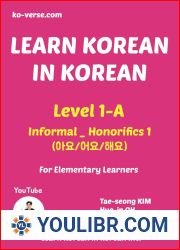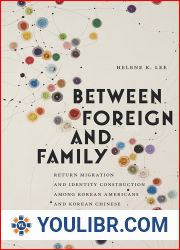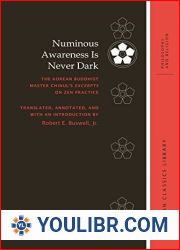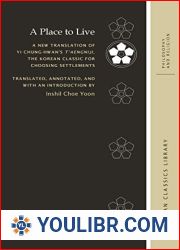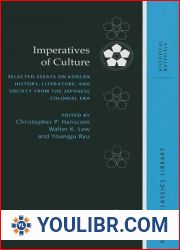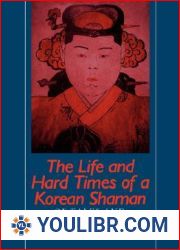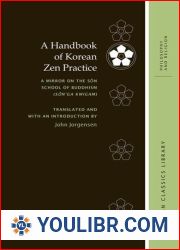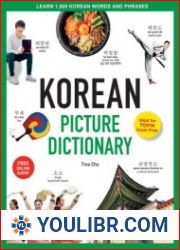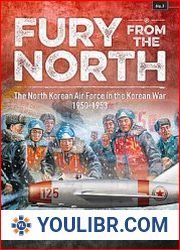
BOOKS - A Korean Confucian Way of Life and Thought: The Chasongnok (Record of Self-Re...

A Korean Confucian Way of Life and Thought: The Chasongnok (Record of Self-Reflection) by Yi Hwang (T'oegye) (Korean Classics Library: Philosophy and Religion)
Author: Edward Y. J. Chung
Year: November 30, 2015
Format: PDF
File size: PDF 1.4 MB
Language: English
Year: November 30, 2015
Format: PDF
File size: PDF 1.4 MB
Language: English
Yi Hwang (1501-1570) - best known by his literary name, T'oegye - is one of the most eminent thinkers in the history of East Asian philosophy and religion. His Chasongnok (Record of self-reflection) is a superb Korean Neo-Confucian text: an eloquent collection of twenty-two scholarly letters and four essays written to his close disciples and junior colleagues. These were carefully selected by T'oegye himself after self-reflecting (chasong) on his practice of personal cultivation. The Chasongnok continuously guided T'oegye and inspired others on the true Confucian way (including leading Neo-Confucians in Tokugawa Japan) while it criticized Buddhism and Daoism. Its philosophical merit rivals T'oegye's monumental Songhak sipto (Ten diagrams on sage learning) and "Four-Seven Debate Letters and "; however, as a testament of T'oegye's character, scholarship, and teaching, the Chasongnok is of greater interest. The work engages with his holistic knowledge and experience of self-cultivation by articulating textual and historical material on various key doctrines and ideas. It is an inspiring practical guide that reveals the depth of T'oegye's learning and spirituality.The present volume offers a fully annotated translation of the Chasongnok. Following a groundbreaking discussion of T'oegye's life and ideas according to the Chasongnok and his other major writings, it presents the core of his thought in six interrelated sections: and "Philosophy of Principle, and " and "Human Nature and Emotions, and " and "Against Buddhism and Daoism, and " and "True Learning, and " and "Self-Cultivation, and " and "Reverence and Spiritual Cultivation. and " The bibliography offers a current catalogue of primary sources and modern works in Korean, Chinese, Japanese, and English. As the first comprehensive study of the Chasongnok, this book is a welcome addition to current literature on Korean classics and East Asian philosophy and religion. By presenting T'oegye's thought-provoking contributions, it sheds new light on the vitality of Confucian wisdom, thereby affording scholars and students with an excellent primary source for East Asian studies in general and Confucian studies in particular.
A Korean Confucian Way of Life and Thought: The Chasongnok Record of Self-Reflection by Yi Hwang T'oegye (Korean Classics Library: Philosophy and Religion) The Chasongnok Record of Self-Reflection, written by Yi Hwang T'oegye, is a seminal text in the history of East Asian philosophy and religion that offers a profound and inspiring guide to self-cultivation and personal development. This book provides a detailed description of the plot of the book, focusing on the need to understand the process of technological evolution and its impact on human survival and unity. Title: A Korean Confucian Way of Life and Thought: The Chasongnok Record of Self-Reflection Author: Yi Hwang T'oegye Publication Date: 2018 Pages: 368 Publisher: Columbia University Press Genre: Philosophy, Religion, Korean Classics, Confucianism Summary: The Chasongnok Record of Self-Reflection is a collection of scholarly letters and essays written by Yi Hwang T'oegye, one of the most eminent thinkers in the history of East Asian philosophy and religion. Корейский конфуцианский образ жизни и мысли: The Chasongnok Record of Self-Reflection by Yi Hwang T 'oegye (Korean Classics Library: «Chasongnok Record of Self-Reflection», написанная И Хван Тёгье, является основополагающим текстом в истории восточноазиатской философии и религии, который предлагает глубокое и вдохновляющее руководство по самосовершенствованию и личностному развитию. Эта книга содержит подробное описание сюжета книги, акцентируя внимание на необходимости понимания процесса технологической эволюции и его влияния на выживание и единство человека. A Korean Confucian Way of Life and Thought: The Chasongnok Record of Self-Reflection Author: Yi Hwang T 'oegye Дата публикации: 2018 Страницы: 368 Издатель: Columbia University Press Жанр: Философия, религия, корейская классика, конфуцианство Резюме: Часонгнокская запись саморефлексии - сборник научных писем и эссе, написанных И Хван Т "оэгье, одним из самых выдающихся мыслителей в истории восточноазиатской философии и религии. PDFファイルをダウンロード pobierz plik pdf descargar archivo pdf download pdf file télécharger le fichier pdf PDF-Datei herunterladen скачать файл PDF تنزيل ملف pdf Scarica il file pdf להוריד קובץ PDF descarregar ficheiro pdf pdf 파일 다운로드 下载 pdf 文件 download pdf file pdf dosyasını indir
Yi Hwang (1501-1570) - am besten bekannt unter seinem literarischen Namen T' oegye - ist einer der bedeutendsten Denker in der Geschichte der ostasiatischen Philosophie und Religion. Sein „Chasongnok“ („Record of Self-Reflection“) ist ein hervorragender koreanischer neokonfuzianischer Text: eine eloquente Sammlung von zweiundzwanzig wissenschaftlichen Briefen und vier Essays, die an seine engen Schüler und jüngeren Kollegen geschrieben wurden. Sie wurden sorgfältig von T' oegye selbst nach Selbstreflexion (chasong) seiner persönlichen Kultivierungspraxis ausgewählt. Chasongnok leitete T' oegye ständig und inspirierte andere zum wahren konfuzianischen Weg (einschließlich der führenden Neokonfuzianer in Japan, Tokugawa), während er den Buddhismus und Taoismus kritisierte. Seine philosophischen Tugenden konkurrieren mit dem monumentalen Songhak-Sipto T 'oegye (Zehn Diagramme über die Ausbildung der Weisen) und „Four-Seven Debate Letters and „; Als Beweis für den Charakter, die Gelehrsamkeit und den Unterricht von T "oegye" ist Chasongnok "jedoch von größerem Interesse. Die Arbeit bezieht sich auf sein ganzheitliches Wissen und seine Erfahrung der Selbstverbesserung, indem er Text- und Geschichtsmaterial zu verschiedenen Schlüsseldoktrinen und -ideen formuliert. Dies ist ein inspirierender praktischer Leitfaden, der die Tiefe des Lernens und der Spiritualität von T' oegye offenbart. Der vorliegende Band bietet eine vollständig kommentierte Übersetzung von Chasongnock. Nach einer bahnbrechenden Diskussion über das Leben und die Ideen von T' oegye in Übereinstimmung mit Chasongnock und seinen anderen Hauptwerken präsentiert er den Kern seines Denkens in sechs miteinander verbundenen Abschnitten: und "Philosophie des Prinzips und" und "Menschliche Natur und Emotionen und" und "Gegen Buddhismus und Taoismus und" und "Wahres Lernen und" und "Selbstverbesserung und" und "Ehrfurcht und spirituelle Verbesserung. und "Bibliographie bietet einen aktuellen Katalog von Primärquellen und zeitgenössischen Werken in Koreanisch, Chinesisch, Japanisch und Englisch. Als erste umfassende Studie von Chasongnok ist dieses Buch eine willkommene Ergänzung der zeitgenössischen Literatur über koreanische Klassiker und ostasiatische Philosophie und Religion. Durch die Präsentation des zum Nachdenken anregenden Beitrags von T' oegye wirft er ein neues Licht auf die Vitalität der konfuzianischen Weisheit und bietet damit Wissenschaftlern und Studenten eine hervorragende Primärquelle für ostasiatische Studien im Allgemeinen und konfuzianische Studien im Besonderen.
Yi Hwan (1501-1570) - más conocido por su nombre literario T' oegye - es uno de los pensadores más destacados en la historia de la filosofía y la religión de Asia oriental. Su «Chasongnock» («Registro de autorreflexión») es un excelente texto neoconfuciano coreano: una elocuente colección de veintidós cartas científicas y cuatro ensayos escritos a sus alumnos cercanos y colegas más jóvenes. Fueron cuidadosamente seleccionados por el propio T' oegye después de la autorreflexión (chasong) de su práctica de perfeccionamiento personal. El «Chasongnok» guió constantemente a T' oegye e inspiró a otros en la verdadera vía confuciana (incluyendo a los principales neoconfucianos en Japón, Tokugawa), mientras criticaba el budismo y el taoísmo. Sus virtudes filosóficas rivalizan con el monumental sipto T 'oegye de Songhak (Diez diagramas sobre el aprendizaje de los sabios) y las «Cuatro-Siete Letras de Debate y «; sin embargo, como evidencia del carácter, la erudición y la enseñanza de T "oegye", Chasongnock "es de mayor interés. El trabajo se relaciona con su conocimiento holístico y su experiencia de auto-perfeccionamiento mediante la formulación de material textual e histórico sobre diversas doctrinas e ideas clave. Es una guía práctica inspiradora que revela la profundidad del aprendizaje y la espiritualidad de T' oegye. El presente volumen ofrece una traducción completamente anotada de Chasongnock. Después de una innovadora discusión sobre la vida y las ideas de T' oegye de acuerdo con Chasongnock y sus otros escritos principales, presenta el núcleo de su pensamiento en seis secciones interrelacionadas: y "Filosofía del Principio, y" y "Naturaleza Humana y Emociones, y" y "Contra el Budismo y el Taoísmo, y" y "Verdadero Aprendizaje, y" y "Auto Perfeccionamiento, y" y "Reverencia y Perfeccionamiento Espiritual. y "La bibliografía ofrece un catálogo actual de fuentes primarias y obras contemporáneas en coreano, chino, japonés e inglés. Como el primer estudio completo de Chasongnock, este libro es una adición bienvenida a la literatura moderna sobre los clásicos coreanos y la filosofía y religión de Asia Oriental. Al presentar la contribución reflexiva de T' oegye, arroja una nueva luz sobre la vitalidad de la sabiduría confuciana, proporcionando así a científicos y estudiantes una excelente fuente primaria para los estudios del Asia oriental en general y los estudios confucianos en particular.
И Хван (1501-1570) - наиболее известный под своим литературным именем Тоэгье - является одним из самых выдающихся мыслителей в истории восточноазиатской философии и религии. Его «Chasongnok» («Запись саморефлексии») - превосходный корейский неоконфуцианский текст, красноречивый сборник из двадцати двух научных писем и четырёх эссе, написанных его близким ученикам и младшим коллегам. Они были тщательно отобраны самим Тоэгье после саморефлексии (часонг) его практики личного совершенствования. The Chasongnok постоянно направлял Toegye и вдохновлял других на истинный конфуцианский путь (включая ведущих неоконфуцианцев в Японии Токугава), в то время как он критиковал буддизм и даосизм. Его философские достоинства соперничают с Toegyes monumental Songhak sipto (Десять диаграмм об обучении мудрецов) и Four-Seven Debate tters и; однако, как свидетельство характера, учёности и преподавания Тёгьеса, Часонгнок представляет больший интерес. Работа связана с его целостными знаниями и опытом самосовершенствования путем формулирования текстового и исторического материала по различным ключевым доктринам и идеям. Это вдохновляющее практическое руководство, которое раскрывает глубину обучения и духовности Toegyes. Настоящий том предлагает полностью аннотированный перевод Часонгнока. После новаторского обсуждения жизни и идей Toegyes в соответствии с Chasongnok и другими его основными трудами, он представляет ядро своей мысли в шести взаимосвязанных разделах и Философия принципа, и и человеческая природа и эмоции, и против буддизма и даосизма, и истинное обучение, и самосовершенствование, и почтение и духовное совершенствование и библиография предлагает текущий каталог первоисточников и современных работ на корейском, китайском, японском и английском языках. Как первое всестороннее исследование Часонгнока, эта книга является желанным дополнением к современной литературе о корейской классике и восточноазиатской философии и религии. Представляя «Toegyes», побуждающий к размышлениям, он проливает новый свет на жизнеспособность конфуцианской мудрости, тем самым предоставляя учёным и студентам превосходный первичный источник для восточноазиатских исследований в целом и конфуцианских исследований в частности.
Yi Hwan (1501-1570) - le plus connu sous son nom littéraire T'oegye - est l'un des penseurs les plus éminents de l'histoire de la philosophie et de la religion de l'Asie de l'Est. Son « Horsongnock » est un excellent texte coréen néoconfucian : un recueil éloquent de vingt-deux lettres scientifiques et quatre essais écrits par ses proches élèves et ses plus jeunes collègues. Ils ont été soigneusement choisis par T'oegye lui-même après l'auto-réflexion (chashong) de sa pratique d'amélioration personnelle. « Chashongnok » a constamment guidé T 'oegye et inspiré d'autres sur la vraie voie confucéenne (y compris les principaux néoconfucéens au Japon Tokugawa), tandis qu'il critiquait le bouddhisme et le taoïsme. Ses vertus philosophiques rivalisent avec le monumental Songhak Sipto T'oegye (Dix diagrammes sur l'apprentissage des sages) et les « Quatre-Sept Lettres de Debate et « ; cependant, comme preuve du caractère, de la science et de l'enseignement de T "oegye", Chasongnok "est plus intéressant. Le travail est lié à ses connaissances holistiques et à son expérience de l'auto-amélioration en formulant des textes et des documents historiques sur diverses doctrines et idées clés. C'est un guide pratique inspirant qui révèle la profondeur de l'apprentissage et de la spiritualité de T'oegye. Le présent volume propose une traduction entièrement annotée de Chasonnock. Après un débat novateur sur la vie et les idées de T'oegye selon Chasongnock et ses autres principaux écrits, il présente le cœur de sa pensée en six sections interconnectées : et "La philosophie du principe, et" et "La nature humaine et les émotions, et" et "Contre le bouddhisme et le taoïsme, et" et "True Learning, et" et "L'auto-amélioration, et" et "La révérence et l'amélioration spirituelle. et "La bibliographie offre un catalogue à jour des sources originales et des œuvres contemporaines en coréen, chinois, japonais et anglais. En tant que première étude complète de Chasongnok, ce livre est un complément bienvenu à la littérature moderne sur les classiques coréens et la philosophie et la religion asiatiques orientales. En présentant la contribution stimulante de T'oegye, il apporte une nouvelle lumière sur la vitalité de la sagesse confucéenne, fournissant ainsi aux scientifiques et aux étudiants une excellente source primaire pour la recherche est-asiatique en général et la recherche confucéenne en particulier.
Yi Hwang (1501-1570) - best known by his literary name, T'oegye - is one of the most eminent thinkers in the history of East Asian philosophy and religion. His Chasongnok (Record of self-reflection) is a superb Korean Neo-Confucian text: an eloquent collection of twenty-two scholarly letters and four essays written to his close disciples and junior colleagues. These were carefully selected by T'oegye himself after self-reflecting (chasong) on his practice of personal cultivation. The Chasongnok continuously guided T'oegye and inspired others on the true Confucian way (including leading Neo-Confucians in Tokugawa Japan) while it criticized Buddhism and Daoism. Its philosophical merit rivals T'oegye's monumental Songhak sipto (Ten diagrams on sage learning) and "Four-Seven Debate Letters and "; however, as a testament of T'oegye's character, scholarship, and teaching, the Chasongnok is of greater interest. The work engages with his holistic knowledge and experience of self-cultivation by articulating textual and historical material on various key doctrines and ideas. It is an inspiring practical guide that reveals the depth of T'oegye's learning and spirituality.The present volume offers a fully annotated translation of the Chasongnok. Following a groundbreaking discussion of T'oegye's life and ideas according to the Chasongnok and his other major writings, it presents the core of his thought in six interrelated sections: and "Philosophy of Principle, and " and "Human Nature and Emotions, and " and "Against Buddhism and Daoism, and " and "True Learning, and " and "Self-Cultivation, and " and "Reverence and Spiritual Cultivation. and " The bibliography offers a current catalogue of primary sources and modern works in Korean, Chinese, Japanese, and English. As the first comprehensive study of the Chasongnok, this book is a welcome addition to current literature on Korean classics and East Asian philosophy and religion. By presenting T'oegye's thought-provoking contributions, it sheds new light on the vitality of Confucian wisdom, thereby affording scholars and students with an excellent primary source for East Asian studies in general and Confucian studies in particular.
E Hwang (1501-1570) - conhecido pelo seu nome literário T 'oegye - é um dos pensadores mais ilustres da história da filosofia e religião da Ásia Oriental. Seu «Churongnok» é um excelente texto neoconfuziano coreano, uma eloquente compilação de vinte e duas cartas científicas e quatro ensaios escritos por seus alunos mais próximos e colegas mais novos. Eles foram cuidadosamente selecionados pelo próprio T 'oegier após a autorreflexão de sua prática de aperfeiçoamento pessoal. "Churongnok" direcionou constantemente T "oegye e inspirou outros para o verdadeiro caminho confúcio (incluindo os principais neoconfianos no Japão, Tocugawa), enquanto ele criticava o budismo e o taoísmo. Suas virtudes filosóficas competem com o monumental Songhak Seepto T 'oegye (Dez gráficos sobre a formação dos sábios) e "Four-Seven Debate Letters'; No entanto, como prova da natureza, da ciência e do ensino de T "oegye", a Sentinela "é mais interessante. O trabalho tem a ver com o seu conhecimento integral e experiência de auto-desenvolvimento através da formulação de texto e material histórico sobre várias doutrinas e ideias essenciais. É um guia prático inspirador que revela a profundidade do aprendizado e espiritualidade de T 'oogier. O presente volume oferece uma tradução completamente anotada do Chasungnock. Depois de um debate inovador sobre a vida e as ideias de T 'oogye, de acordo com Chasongnok e outros de seus trabalhos básicos, ele representa o núcleo de seu pensamento em seis seções interligadas: «A Filosofia do Princípio, e» A Natureza e as Emoções Humanas «e» Contra o Budismo e o Taoísmo «e» True Learning, «e» Auto-Aperfeiçoamento, e «Piedade e Aperfeiçoamento Espiritual». e "A bíblia oferece um catálogo relevante de fontes primárias e trabalhos modernos em coreano, chinês, japonês e inglês. Como o primeiro estudo completo de Chasongnok, este livro é um complemento desejado para a literatura moderna sobre clássicos coreanos e filosofia e religião da Ásia Oriental. Apresentando a contribuição reflexiva de T 'oogye, ele lança uma nova luz sobre a viabilidade da sabedoria confuçana, fornecendo aos cientistas e estudantes uma excelente fonte primária para a pesquisa do leste da Ásia em geral e para a pesquisa confuçana em particular.
Hwang (1501-1570) - il più noto con il suo nome letterario, T'oegier - è uno dei pensatori più illustri della storia della filosofia e della religione dell'Asia orientale. Il suo «Sentinella» è un eccellente testo neoconfuciano coreano: una raccolta eloquente di ventidue lettere scientifiche e quattro saggi scritti da suoi cari discepoli e colleghi più piccoli. Sono stati accuratamente selezionati da T 'oegier stesso dopo l'autoreferenzializzazione (Sentong) della sua pratica di perfezionamento personale. Sentinongnok guidava sempre T Oegye e ispirava altri alla vera via confuciana (inclusi i principali neonofuciani in Giappone, Tokugawa), mentre criticava il buddismo e il taoismo. Le sue virtù filosofiche competono con il monumentale Songhako T'oegye (Dieci diagrammi sull'apprendimento dei saggi) e i Four-Seven Debate Letters; ma, come prova della natura, della scienza e dell'insegnamento di T "Oegier", la Sentinella "è più interessante. Il lavoro riguarda le sue conoscenze olistiche e le sue esperienze di auto-miglioramento attraverso la formulazione di testi e materiali storici su diverse dottrine e idee chiave. È una guida pratica stimolante che rivela la profondità dell'apprendimento e della spiritualità di T'oegier. Il vero volume offre una traduzione interamente annotata di Sentinongnock. Dopo aver discusso in modo innovativo la vita e le idee di T "Oegier secondo Sentongnok e gli altri suoi lavori principali, rappresenta il nucleo del suo pensiero in sei sezioni interconnesse: E "la filosofia del principio, e" La natura umana e le emozioni, e "contro il buddismo e il taoismo," e "True Learning," e "L'auto-miglioramento," e "La benevolenza e il miglioramento spirituale. e "Bibliografia offre un catalogo aggiornato di prime origini e opere contemporanee in coreano, cinese, giapponese e inglese. Come primo studio completo di Chahongnok, questo libro è un auspicabile supplemento alla letteratura moderna sui classici coreani e la filosofia e la religione dell'Asia orientale. Presentando il contributo riflettente di T'Oegier, egli mette in luce la vitalità della saggezza confuciana, fornendo agli scienziati e agli studenti una fonte primaria eccellente per la ricerca dell'Asia orientale in generale e per la ricerca confuciana in particolare.
Yi Hwang (1501-1570) - am besten bekannt unter seinem literarischen Namen T' oegye - ist einer der bedeutendsten Denker in der Geschichte der ostasiatischen Philosophie und Religion. Sein „Chasongnok“ („Record of Self-Reflection“) ist ein hervorragender koreanischer neokonfuzianischer Text: eine eloquente Sammlung von zweiundzwanzig wissenschaftlichen Briefen und vier Essays, die an seine engen Schüler und jüngeren Kollegen geschrieben wurden. Sie wurden sorgfältig von T' oegye selbst nach Selbstreflexion (chasong) seiner persönlichen Kultivierungspraxis ausgewählt. Chasongnok leitete T' oegye ständig und inspirierte andere zum wahren konfuzianischen Weg (einschließlich der führenden Neokonfuzianer in Japan, Tokugawa), während er den Buddhismus und Taoismus kritisierte. Seine philosophischen Tugenden konkurrieren mit dem monumentalen Songhak-Sipto T 'oegye (Zehn Diagramme über die Ausbildung der Weisen) und „Four-Seven Debate Letters and „; Als Beweis für den Charakter, die Gelehrsamkeit und den Unterricht von T "oegye" ist Chasongnok "jedoch von größerem Interesse. Die Arbeit bezieht sich auf sein ganzheitliches Wissen und seine Erfahrung der Selbstverbesserung, indem er Text- und Geschichtsmaterial zu verschiedenen Schlüsseldoktrinen und -ideen formuliert. Dies ist ein inspirierender praktischer Leitfaden, der die Tiefe des Lernens und der Spiritualität von T' oegye offenbart. Der vorliegende Band bietet eine vollständig kommentierte Übersetzung von Chasongnock. Nach einer bahnbrechenden Diskussion über das Leben und die Ideen von T' oegye in Übereinstimmung mit Chasongnock und seinen anderen Hauptwerken präsentiert er den Kern seines Denkens in sechs miteinander verbundenen Abschnitten: und "Philosophie des Prinzips und" und "Menschliche Natur und Emotionen und" und "Gegen Buddhismus und Taoismus und" und "Wahres Lernen und" und "Selbstverbesserung und" und "Ehrfurcht und spirituelle Verbesserung. und "Bibliographie bietet einen aktuellen Katalog von Primärquellen und zeitgenössischen Werken in Koreanisch, Chinesisch, Japanisch und Englisch. Als erste umfassende Studie von Chasongnok ist dieses Buch eine willkommene Ergänzung der zeitgenössischen Literatur über koreanische Klassiker und ostasiatische Philosophie und Religion. Durch die Präsentation des zum Nachdenken anregenden Beitrags von T' oegye wirft er ein neues Licht auf die Vitalität der konfuzianischen Weisheit und bietet damit Wissenschaftlern und Studenten eine hervorragende Primärquelle für ostasiatische Studien im Allgemeinen und konfuzianische Studien im Besonderen.
Yi Hwan (1501-1570) - más conocido por su nombre literario T' oegye - es uno de los pensadores más destacados en la historia de la filosofía y la religión de Asia oriental. Su «Chasongnock» («Registro de autorreflexión») es un excelente texto neoconfuciano coreano: una elocuente colección de veintidós cartas científicas y cuatro ensayos escritos a sus alumnos cercanos y colegas más jóvenes. Fueron cuidadosamente seleccionados por el propio T' oegye después de la autorreflexión (chasong) de su práctica de perfeccionamiento personal. El «Chasongnok» guió constantemente a T' oegye e inspiró a otros en la verdadera vía confuciana (incluyendo a los principales neoconfucianos en Japón, Tokugawa), mientras criticaba el budismo y el taoísmo. Sus virtudes filosóficas rivalizan con el monumental sipto T 'oegye de Songhak (Diez diagramas sobre el aprendizaje de los sabios) y las «Cuatro-Siete Letras de Debate y «; sin embargo, como evidencia del carácter, la erudición y la enseñanza de T "oegye", Chasongnock "es de mayor interés. El trabajo se relaciona con su conocimiento holístico y su experiencia de auto-perfeccionamiento mediante la formulación de material textual e histórico sobre diversas doctrinas e ideas clave. Es una guía práctica inspiradora que revela la profundidad del aprendizaje y la espiritualidad de T' oegye. El presente volumen ofrece una traducción completamente anotada de Chasongnock. Después de una innovadora discusión sobre la vida y las ideas de T' oegye de acuerdo con Chasongnock y sus otros escritos principales, presenta el núcleo de su pensamiento en seis secciones interrelacionadas: y "Filosofía del Principio, y" y "Naturaleza Humana y Emociones, y" y "Contra el Budismo y el Taoísmo, y" y "Verdadero Aprendizaje, y" y "Auto Perfeccionamiento, y" y "Reverencia y Perfeccionamiento Espiritual. y "La bibliografía ofrece un catálogo actual de fuentes primarias y obras contemporáneas en coreano, chino, japonés e inglés. Como el primer estudio completo de Chasongnock, este libro es una adición bienvenida a la literatura moderna sobre los clásicos coreanos y la filosofía y religión de Asia Oriental. Al presentar la contribución reflexiva de T' oegye, arroja una nueva luz sobre la vitalidad de la sabiduría confuciana, proporcionando así a científicos y estudiantes una excelente fuente primaria para los estudios del Asia oriental en general y los estudios confucianos en particular.
И Хван (1501-1570) - наиболее известный под своим литературным именем Тоэгье - является одним из самых выдающихся мыслителей в истории восточноазиатской философии и религии. Его «Chasongnok» («Запись саморефлексии») - превосходный корейский неоконфуцианский текст, красноречивый сборник из двадцати двух научных писем и четырёх эссе, написанных его близким ученикам и младшим коллегам. Они были тщательно отобраны самим Тоэгье после саморефлексии (часонг) его практики личного совершенствования. The Chasongnok постоянно направлял Toegye и вдохновлял других на истинный конфуцианский путь (включая ведущих неоконфуцианцев в Японии Токугава), в то время как он критиковал буддизм и даосизм. Его философские достоинства соперничают с Toegyes monumental Songhak sipto (Десять диаграмм об обучении мудрецов) и Four-Seven Debate tters и; однако, как свидетельство характера, учёности и преподавания Тёгьеса, Часонгнок представляет больший интерес. Работа связана с его целостными знаниями и опытом самосовершенствования путем формулирования текстового и исторического материала по различным ключевым доктринам и идеям. Это вдохновляющее практическое руководство, которое раскрывает глубину обучения и духовности Toegyes. Настоящий том предлагает полностью аннотированный перевод Часонгнока. После новаторского обсуждения жизни и идей Toegyes в соответствии с Chasongnok и другими его основными трудами, он представляет ядро своей мысли в шести взаимосвязанных разделах и Философия принципа, и и человеческая природа и эмоции, и против буддизма и даосизма, и истинное обучение, и самосовершенствование, и почтение и духовное совершенствование и библиография предлагает текущий каталог первоисточников и современных работ на корейском, китайском, японском и английском языках. Как первое всестороннее исследование Часонгнока, эта книга является желанным дополнением к современной литературе о корейской классике и восточноазиатской философии и религии. Представляя «Toegyes», побуждающий к размышлениям, он проливает новый свет на жизнеспособность конфуцианской мудрости, тем самым предоставляя учёным и студентам превосходный первичный источник для восточноазиатских исследований в целом и конфуцианских исследований в частности.
Yi Hwan (1501-1570) - le plus connu sous son nom littéraire T'oegye - est l'un des penseurs les plus éminents de l'histoire de la philosophie et de la religion de l'Asie de l'Est. Son « Horsongnock » est un excellent texte coréen néoconfucian : un recueil éloquent de vingt-deux lettres scientifiques et quatre essais écrits par ses proches élèves et ses plus jeunes collègues. Ils ont été soigneusement choisis par T'oegye lui-même après l'auto-réflexion (chashong) de sa pratique d'amélioration personnelle. « Chashongnok » a constamment guidé T 'oegye et inspiré d'autres sur la vraie voie confucéenne (y compris les principaux néoconfucéens au Japon Tokugawa), tandis qu'il critiquait le bouddhisme et le taoïsme. Ses vertus philosophiques rivalisent avec le monumental Songhak Sipto T'oegye (Dix diagrammes sur l'apprentissage des sages) et les « Quatre-Sept Lettres de Debate et « ; cependant, comme preuve du caractère, de la science et de l'enseignement de T "oegye", Chasongnok "est plus intéressant. Le travail est lié à ses connaissances holistiques et à son expérience de l'auto-amélioration en formulant des textes et des documents historiques sur diverses doctrines et idées clés. C'est un guide pratique inspirant qui révèle la profondeur de l'apprentissage et de la spiritualité de T'oegye. Le présent volume propose une traduction entièrement annotée de Chasonnock. Après un débat novateur sur la vie et les idées de T'oegye selon Chasongnock et ses autres principaux écrits, il présente le cœur de sa pensée en six sections interconnectées : et "La philosophie du principe, et" et "La nature humaine et les émotions, et" et "Contre le bouddhisme et le taoïsme, et" et "True Learning, et" et "L'auto-amélioration, et" et "La révérence et l'amélioration spirituelle. et "La bibliographie offre un catalogue à jour des sources originales et des œuvres contemporaines en coréen, chinois, japonais et anglais. En tant que première étude complète de Chasongnok, ce livre est un complément bienvenu à la littérature moderne sur les classiques coréens et la philosophie et la religion asiatiques orientales. En présentant la contribution stimulante de T'oegye, il apporte une nouvelle lumière sur la vitalité de la sagesse confucéenne, fournissant ainsi aux scientifiques et aux étudiants une excellente source primaire pour la recherche est-asiatique en général et la recherche confucéenne en particulier.
Yi Hwang (1501-1570) - best known by his literary name, T'oegye - is one of the most eminent thinkers in the history of East Asian philosophy and religion. His Chasongnok (Record of self-reflection) is a superb Korean Neo-Confucian text: an eloquent collection of twenty-two scholarly letters and four essays written to his close disciples and junior colleagues. These were carefully selected by T'oegye himself after self-reflecting (chasong) on his practice of personal cultivation. The Chasongnok continuously guided T'oegye and inspired others on the true Confucian way (including leading Neo-Confucians in Tokugawa Japan) while it criticized Buddhism and Daoism. Its philosophical merit rivals T'oegye's monumental Songhak sipto (Ten diagrams on sage learning) and "Four-Seven Debate Letters and "; however, as a testament of T'oegye's character, scholarship, and teaching, the Chasongnok is of greater interest. The work engages with his holistic knowledge and experience of self-cultivation by articulating textual and historical material on various key doctrines and ideas. It is an inspiring practical guide that reveals the depth of T'oegye's learning and spirituality.The present volume offers a fully annotated translation of the Chasongnok. Following a groundbreaking discussion of T'oegye's life and ideas according to the Chasongnok and his other major writings, it presents the core of his thought in six interrelated sections: and "Philosophy of Principle, and " and "Human Nature and Emotions, and " and "Against Buddhism and Daoism, and " and "True Learning, and " and "Self-Cultivation, and " and "Reverence and Spiritual Cultivation. and " The bibliography offers a current catalogue of primary sources and modern works in Korean, Chinese, Japanese, and English. As the first comprehensive study of the Chasongnok, this book is a welcome addition to current literature on Korean classics and East Asian philosophy and religion. By presenting T'oegye's thought-provoking contributions, it sheds new light on the vitality of Confucian wisdom, thereby affording scholars and students with an excellent primary source for East Asian studies in general and Confucian studies in particular.
E Hwang (1501-1570) - conhecido pelo seu nome literário T 'oegye - é um dos pensadores mais ilustres da história da filosofia e religião da Ásia Oriental. Seu «Churongnok» é um excelente texto neoconfuziano coreano, uma eloquente compilação de vinte e duas cartas científicas e quatro ensaios escritos por seus alunos mais próximos e colegas mais novos. Eles foram cuidadosamente selecionados pelo próprio T 'oegier após a autorreflexão de sua prática de aperfeiçoamento pessoal. "Churongnok" direcionou constantemente T "oegye e inspirou outros para o verdadeiro caminho confúcio (incluindo os principais neoconfianos no Japão, Tocugawa), enquanto ele criticava o budismo e o taoísmo. Suas virtudes filosóficas competem com o monumental Songhak Seepto T 'oegye (Dez gráficos sobre a formação dos sábios) e "Four-Seven Debate Letters'; No entanto, como prova da natureza, da ciência e do ensino de T "oegye", a Sentinela "é mais interessante. O trabalho tem a ver com o seu conhecimento integral e experiência de auto-desenvolvimento através da formulação de texto e material histórico sobre várias doutrinas e ideias essenciais. É um guia prático inspirador que revela a profundidade do aprendizado e espiritualidade de T 'oogier. O presente volume oferece uma tradução completamente anotada do Chasungnock. Depois de um debate inovador sobre a vida e as ideias de T 'oogye, de acordo com Chasongnok e outros de seus trabalhos básicos, ele representa o núcleo de seu pensamento em seis seções interligadas: «A Filosofia do Princípio, e» A Natureza e as Emoções Humanas «e» Contra o Budismo e o Taoísmo «e» True Learning, «e» Auto-Aperfeiçoamento, e «Piedade e Aperfeiçoamento Espiritual». e "A bíblia oferece um catálogo relevante de fontes primárias e trabalhos modernos em coreano, chinês, japonês e inglês. Como o primeiro estudo completo de Chasongnok, este livro é um complemento desejado para a literatura moderna sobre clássicos coreanos e filosofia e religião da Ásia Oriental. Apresentando a contribuição reflexiva de T 'oogye, ele lança uma nova luz sobre a viabilidade da sabedoria confuçana, fornecendo aos cientistas e estudantes uma excelente fonte primária para a pesquisa do leste da Ásia em geral e para a pesquisa confuçana em particular.
Hwang (1501-1570) - il più noto con il suo nome letterario, T'oegier - è uno dei pensatori più illustri della storia della filosofia e della religione dell'Asia orientale. Il suo «Sentinella» è un eccellente testo neoconfuciano coreano: una raccolta eloquente di ventidue lettere scientifiche e quattro saggi scritti da suoi cari discepoli e colleghi più piccoli. Sono stati accuratamente selezionati da T 'oegier stesso dopo l'autoreferenzializzazione (Sentong) della sua pratica di perfezionamento personale. Sentinongnok guidava sempre T Oegye e ispirava altri alla vera via confuciana (inclusi i principali neonofuciani in Giappone, Tokugawa), mentre criticava il buddismo e il taoismo. Le sue virtù filosofiche competono con il monumentale Songhako T'oegye (Dieci diagrammi sull'apprendimento dei saggi) e i Four-Seven Debate Letters; ma, come prova della natura, della scienza e dell'insegnamento di T "Oegier", la Sentinella "è più interessante. Il lavoro riguarda le sue conoscenze olistiche e le sue esperienze di auto-miglioramento attraverso la formulazione di testi e materiali storici su diverse dottrine e idee chiave. È una guida pratica stimolante che rivela la profondità dell'apprendimento e della spiritualità di T'oegier. Il vero volume offre una traduzione interamente annotata di Sentinongnock. Dopo aver discusso in modo innovativo la vita e le idee di T "Oegier secondo Sentongnok e gli altri suoi lavori principali, rappresenta il nucleo del suo pensiero in sei sezioni interconnesse: E "la filosofia del principio, e" La natura umana e le emozioni, e "contro il buddismo e il taoismo," e "True Learning," e "L'auto-miglioramento," e "La benevolenza e il miglioramento spirituale. e "Bibliografia offre un catalogo aggiornato di prime origini e opere contemporanee in coreano, cinese, giapponese e inglese. Come primo studio completo di Chahongnok, questo libro è un auspicabile supplemento alla letteratura moderna sui classici coreani e la filosofia e la religione dell'Asia orientale. Presentando il contributo riflettente di T'Oegier, egli mette in luce la vitalità della saggezza confuciana, fornendo agli scienziati e agli studenti una fonte primaria eccellente per la ricerca dell'Asia orientale in generale e per la ricerca confuciana in particolare.







